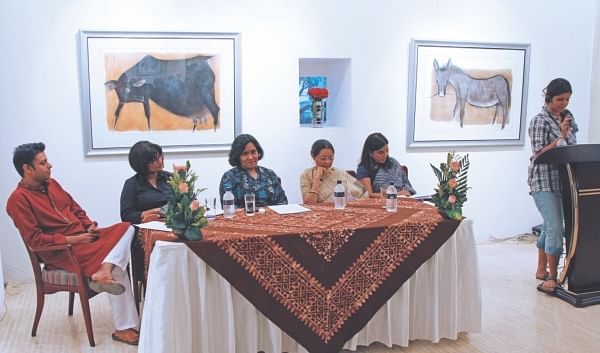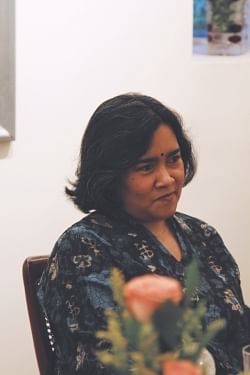| Home - Back Issues - The Team - Contact Us |
 |
| Volume 11 |Issue 13| March 30, 2012 | |
|
|
Event A Writer of Conscience Sushmita S Preetha
For regular readers of The Star, Farah Ghuznavi is an easily recognisable name. We know her as the witty storyteller whose columns we eagerly devour on lazy Friday mornings. Perhaps not everyone knows that the inimitable woman behind the 'Food for Thought' column is a talented and versatile literary figure, whose works have been published in the UK, US, Canada and Singapore. Apart from her weekly columns, she writes short stories, flash fiction and non-fiction pieces on a range of different issues, which are inspired by, but not limited to, her work as a development worker and activist. “I've been following Farah's columns and short stories for many years now. It's very real, what Farah writes about. It comes directly from her own experiences,” stated Dr Perween Hasan, Professor, Department of Islamic History and Culture, University of Dhaka, in a book reading organised on March 24, in the plush new premises of the Bengal Art Lounge on Gulshan Avenue. The event featured selected fiction and creative non-fiction pieces by Farah Ghuznavi, followed by a question-and-answer session with the writer. Dr Perween Hasan, Aasha Mehreen Amin, editor of The Star Magazine, Dr K Anis Ahmed, writer and Director of Academic Affairs of University of Liberal Arts Bangladesh (ULAB) and Sadaf Saaz Siddiqi, writer, activist and entrepreneur, spoke at the event, exploring the various dimensions to Farah's work.
The four pieces read at the event were 'Old Delhi, New Tricks', 'Judgment Day', 'Waiting', and 'The Homecoming'. 'Old Delhi, New Tricks', the first story read at the event, is an amusing and cheeky tale of displacement, alienation, struggle and ultimately victory, when Farah, not quite at home in the not-quite-so-foreign Delhi, manages to put the roguish scooter driver in his rightful place with the perfect use of her less-than-perfect Hindi. The piece is decidedly Farah (at least the Farah we are familiar with), with its subtle understated humour and anecdotes of enlightening escapades. 'Judgement Day', on the other hand, comes as a pleasant surprise. It is the writer's first attempt at feminist science-fiction and brilliantly portrays the vulnerability and eventual redundancy of women in the face of male-driven technological expansion. It received Highly Commended in the 2010 Commonwealth Short Story Competition. Although Farah has been writing for most of her life – “from doggerel as a child to satirical plays and poems in [her] youth; opinion pieces and newspaper articles on politics, humour, travel and social issues as an adult” – it was only in 2005 that she began to experiment with creative writing. Enraged upon reading about an incident of abuse of a domestic help in a well-off home, she called her editor immediately. “She asked me to write a column,” she recalls, “but I told her that people who beat up children are not interested in hearing Farah Ghuznavi tell them not to do it. It must be done with more subtlety. What if we wrote a fiction piece from the child's perspective?” Although Farah had initially suggested that her editor designate the task of writing the story to someone else, once she sat down in front of the computer, the story flew on its own. “It's never been that easy since then, though,” she adds with a chuckle. Since then, Farah has written numerous short stories and flash fiction, many of which are critically acclaimed both here and abroad. “What I like about Farah's work, in terms of her choice of subject, is that even though she writes in English, she doesn't write only about the English speaking people of our country,” says Dr Ahmed. He highlights the brilliance and ease with which Farah manages to encompass and portray the struggles, experiences and complexities of people from diverse backgrounds – from those living in fancy buildings to those in the villages or slums. “The characters in her stories are not approached with an anthropological condescension, which sometimes happens when we try to write about people who are out of our experiences and are far more economically disadvantaged that we are. It is very important to get into the interiority of those characters, which I think Farah does very well, without making it seem just sociological,” he maintains. Frah has worked for NGOs in Bangladesh, Britain, Africa, including the United Nations, and the Grameen Bank. As such, a lot of her work is based on her experiences as a development practitioner and activist. Her characters are compelling and complex, and she has the power to engage her readers in social and political matters in a way that doesn't bore them. “It's a great danger when you have a development professional, an activist, writing fiction, because you really want to say, 'None of this is acceptable! Please stop this immediately'. But you have to say it in a way that people will engage with, and not feel it is moralising or lecturing,” explains the writer. Farah, however, manages to strike that difficult and delicate balance between depicting an engaging story and exposing issues of oppression and inequality. Speaking about why her characters are almost always based in Bangladesh, and why she has not published a 'migrant story' (as is typical of writers of this region), she says, “I am more concerned about telling the story of Bangladesh through my particular lens, because I think it is a fascinating place, and there are a million stories happening. And yet, the stories that we hear tend to be very particular: it is either the village/slum despair story or the high class debauchery story. That may be our frame of reference and of course that will be reflected in our writings, but I would like to go beyond.” Currently, Farah is editing an anthology on writing by young Bangladeshi women writers for the Indian publisher Zubaan books. Her work has been published in Woman's Work: Short Stories (GirlChild Press, USA), The Monster Book for Girls (Exaggerated Press, UK), Curbside Splendor Issues 1 and 2 (Curbside Splendor, USA), The Rainbow Feast (Marshall Cavendish, Singapore), Journeys (Sampad, Britain) launched at the Birmingham Literary Festival, What the Ink? (Writer's Block, Bangladesh) and From the Delta (UPL, Bangladesh).
|
||||
Copyright
(R) thedailystar.net 2012 |

